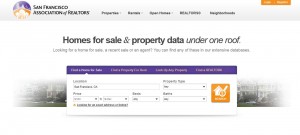By Leah Etling on July 16, 2013 in News
Walt Baczkowski thinks real estate listing syndication has jumped the shark. But the CEO of the San Francisco Association of REALTORS® (SFAR) has already figured out how to bring happy days back again.
In recent months, sentiment surrounding consumer-facing real estate syndicators like Zillow and Trulia has shifted. REALTORS® and Multiple Listing Services have expressed concern about the practice of “scraping” exercised by some listing aggregators, which entails reusing listing data without permission from the broker or agent representing the property.
recent months, sentiment surrounding consumer-facing real estate syndicators like Zillow and Trulia has shifted. REALTORS® and Multiple Listing Services have expressed concern about the practice of “scraping” exercised by some listing aggregators, which entails reusing listing data without permission from the broker or agent representing the property.
Another concern is the ability for a prospective buyer to easily reach out and contact the listing broker/agent, whose status as the primary contact for the property listed isn’t always clear. Many real estate professionals are realizing that more control over their listing information is preferred, instead of reckless syndication that may produce no real results.
“It jumped the shark because it became a detriment to the REALTORS® when they lost control,” Baczkowski explained. “Their pictures weren’t even appearing next to their listings. And then people were taking their listings, and doing things with them. It started out being this great benefit, but it suddenly turned into a negative. Now, it’s time to take back control of the data.”
For SFAR, that meant setting up a consumer-facing real estate search portal site, developed by Point2. Consumers can search for homes and businesses for sale and rent, with all the data sourced directly from the San Francisco Multiple Listings Service website. If updates are made by a broker or agent to the listing – like a pending sale – the consumer site will also be updated in near real-time.
In a city with a residential real estate market so hot that there are only 900 active listings, on average, of homes for sale, the timeliness of the available data is absolutely crucial. In a climate as competitive as San Francisco’s, finding out about a new listing as soon as it becomes public knowledge can be immensely valuable. After all, many homes go under contract less than 48 hours after they hit the market – the same amount of time it would take to get them listed on a syndicator.
“Most REALTORS®, when they get a call and hear the client say: ‘I saw this property on Zillow,’ they go ‘Uh oh.’ They know, it’s going to be a property that’s probably sold, probably in contract, or it has been taken off the market,” Baczkowski said.
With the new portal site already up and running, Baczkowski and SFAR are now educating the public about why a syndicated listing site may not be the smartest place to start your real estate search. Agents and brokers are already ecstatic about the new approach, he said. The website operates at no additional charge to MLS members and delivers more trustworthy results.
Syndication sites give preferential treatment to agents who pay for subscriptions and are rewarded with status as a “recommended” or “premier” agent, making them more visible.
“If the agent isn’t a paid participant in the portal, their listing is going to show up after the ones that have agents who have paid, even though they don’t match as specifically to the consumer. I believe that is misleading to the consumer and not providing a true service,” Baczkowski said.
San Francisco is just one city where the Association of REALTORS® decided to take action and encourage heightened data integrity. El Paso, Texas, has also moved forward with a MLS portal site, and many more MLSs are close behind.
“By partnering with Point2, we feel it will position our new public portal and our members as the most trusted source for real estate in our region,” said Jason Sanchez, Director of MLS & Technology for The Greater El Paso Association of REALTORS® (GEPAR). “With sites like Zillow and Trulia dominating the industry, it is crucial that MLSs remain relevant by positioning themselves as the best and most reliable source for real estate in their respective marketplaces.”
That leaves one challenge – educating the consumer. Even though online real estate search traffic is already highly stratified – one analysis found that the top 10 most visited sites for real estate didn’t even collect 50 percent of the traffic. Getting the word out to buyers and sellers that localized, real-time listing data is available in their area will be key.
SFAR is planning a three-pronged approach. Baczkowski has already recruited 4,500 evangelists – brokers and agents who are SFAR members and interact with clients every day. He’ll buoy their buy-in and word of mouth with an advertising campaign, as well as search optimization of keyword search terms relevant to San Francisco real estate.
With so much rapid change in the real estate listing landscape, Baczkowski sees the future goal as one of standardization of listing values – along the lines of the 99-cent-per-song iTunes pricing scale. In the existing model, syndicators are profiting heavily off data that belongs to Realtors® and MLSs, but has become a valuable hostage in the real estate information economy.
“In music, there was a standard decided as to what each song was going to be worth and the amount of money was going to go back to the artist. That’s the same model that needs to be used in the real estate business. The first thing we have to do is to put the listings back in the control of the brokers and the MLSs. MLSs are the conduit, a conduit that provides the security they need.”


